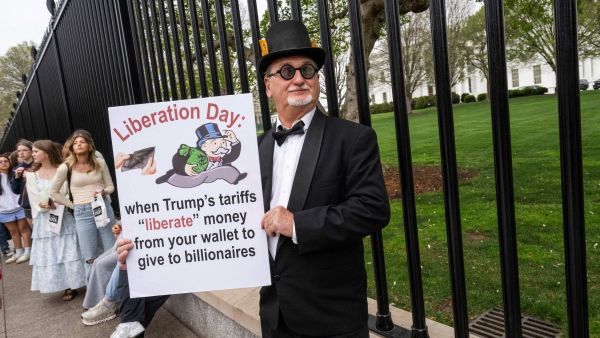Baghdad /NINA/- Australian Prime Minister Anthony Albanese stressed that the American people will pay the highest price for these tariffs, which he described as unjustified.
He said on Australian radio: "For this reason, the Australian government will not seek to impose reciprocal tariffs, nor will it engage in a race to the bottom that would lead to higher prices and slower growth."
For her part, Italian Prime Minister Giorgia Meloni warned that a trade war would only weaken the West.
Meloni said in a statement, "The United States' imposition of tariffs on the European Union is a move I consider wrong and in the interests of neither party. We will do our utmost to reach an agreement with the United States to avoid a trade war that will inevitably weaken the West to the benefit of other global players."
Meanwhile, British Trade Secretary Jonathan Reynolds announced that the United Kingdom remains committed to reaching an agreement with the United States to "mitigate" the impact of the new US tariffs, stressing that London does not intend to take immediate retaliatory measures.
In this context, the Brazilian Parliament passed a law authorizing the government to take measures to respond to any trade restrictions that hinder the country's exports. The government stated, "We regret the decision taken by the US government to impose an additional 10 percent tariff on all Brazilian exports."
It added that it is "evaluating all possible measures to ensure reciprocity in bilateral trade, including recourse to the World Trade Organization."
For its part, Australian Prime Minister Anthony Albanese declared that Trump's tariffs are "completely unjustified" and would alter his country's relationship with the United States.
Irish Prime Minister Micheal Martin also expressed his "deep regret" over US President Donald Trump's imposition of 20 percent tariffs on his country's imports from the European Union, calling on the bloc's 27 member states to respond to Washington in a "proportionate" manner.
Danish Foreign Minister Lars Løkke Rasmussen said, "Everyone has benefited from global trade. I don't understand why the United States wants to wage a trade war against Europe. No one wins, everyone loses." He emphasized that "Europe will remain united and will provide strong and proportionate responses." The German chemical industry, which considers the United States its largest importer, called on the European Union to exercise calm in its response to Trump's tariffs, stressing that escalation will only exacerbate the damage.
The Federation of the German Chemical Industry (VIC), which includes the giants Bayer and BASF, said, "We regret the US government's decision... It is now important for all parties involved to remain calm."
For its part, the Federation of the German Automotive Industry (VDA) condemned the tariffs, calling on the European Union to respond forcefully, as they "will cause significant losses," while urging it to "continue to express its willingness to negotiate."
The VDA also warned that the losses will not be limited to Germany, but will also affect American consumers and the American auto industry itself. It called on Brussels to conclude free trade agreements "with as many regions of the world as possible" so that the EU can become a "champion of free and fair global trade."
He said on Australian radio: "For this reason, the Australian government will not seek to impose reciprocal tariffs, nor will it engage in a race to the bottom that would lead to higher prices and slower growth."
For her part, Italian Prime Minister Giorgia Meloni warned that a trade war would only weaken the West.
Meloni said in a statement, "The United States' imposition of tariffs on the European Union is a move I consider wrong and in the interests of neither party. We will do our utmost to reach an agreement with the United States to avoid a trade war that will inevitably weaken the West to the benefit of other global players."
Meanwhile, British Trade Secretary Jonathan Reynolds announced that the United Kingdom remains committed to reaching an agreement with the United States to "mitigate" the impact of the new US tariffs, stressing that London does not intend to take immediate retaliatory measures.
In this context, the Brazilian Parliament passed a law authorizing the government to take measures to respond to any trade restrictions that hinder the country's exports. The government stated, "We regret the decision taken by the US government to impose an additional 10 percent tariff on all Brazilian exports."
It added that it is "evaluating all possible measures to ensure reciprocity in bilateral trade, including recourse to the World Trade Organization."
For its part, Australian Prime Minister Anthony Albanese declared that Trump's tariffs are "completely unjustified" and would alter his country's relationship with the United States.
Irish Prime Minister Micheal Martin also expressed his "deep regret" over US President Donald Trump's imposition of 20 percent tariffs on his country's imports from the European Union, calling on the bloc's 27 member states to respond to Washington in a "proportionate" manner.
Danish Foreign Minister Lars Løkke Rasmussen said, "Everyone has benefited from global trade. I don't understand why the United States wants to wage a trade war against Europe. No one wins, everyone loses." He emphasized that "Europe will remain united and will provide strong and proportionate responses." The German chemical industry, which considers the United States its largest importer, called on the European Union to exercise calm in its response to Trump's tariffs, stressing that escalation will only exacerbate the damage.
The Federation of the German Chemical Industry (VIC), which includes the giants Bayer and BASF, said, "We regret the US government's decision... It is now important for all parties involved to remain calm."
For its part, the Federation of the German Automotive Industry (VDA) condemned the tariffs, calling on the European Union to respond forcefully, as they "will cause significant losses," while urging it to "continue to express its willingness to negotiate."
The VDA also warned that the losses will not be limited to Germany, but will also affect American consumers and the American auto industry itself. It called on Brussels to conclude free trade agreements "with as many regions of the world as possible" so that the EU can become a "champion of free and fair global trade."










